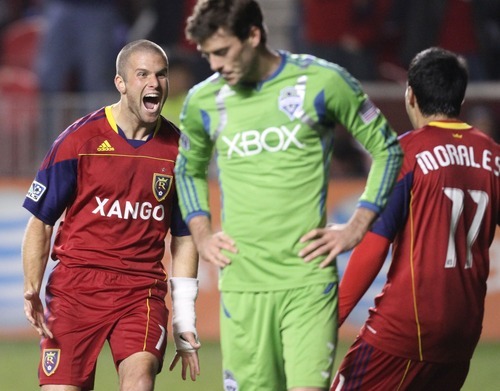This is an archived article that was published on sltrib.com in 2012, and information in the article may be outdated. It is provided only for personal research purposes and may not be reprinted.
The MLS TV schedule is out, and — once again — Real Salt Lake is an afterthought.
The local team will make four appearances on the NBC Sports Network (the channel formerly known as Versus) and zero on ESPN networks.
No ESPN. No ESPN2. Not even ESPN Deportes.
Compare that to 15 national TV appearances each for the New York Red Bulls and Los Angeles Galaxy.
Trey Fitz-Gerald, RSL's vice president of broadcasting and communication, called it "disappointing" and "an annoyance." It's certainly that for RSL fans, who have reason to complain that their team has been disrespected. Again.
The networks' MLS schedule is understandable, if you think the way network executives think. Because they think that teams in large TV markets will draw more viewers than teams in small TV markets.
But that's short-sighted. MLS and its broadcast partners are trying to build a fan base, and one way to do that is to put a team that plays an exciting, attacking brand of soccer on the schedule. A team like RSL.
There's some indication that league representatives made that argument to NBC and ESPN, but it fell on deaf ears.
As it is, only four teams make fewer appearances on American TV networks — New England and the three Canadian teams, Montreal, Toronto and Vancouver. And the Canadian teams will appear frequently on a Canadian network.
So, sure, RSL fans are insulted. But there's another way to look at it.
It doesn't matter.
This isn't college football. There are no polls to decide who gets to play for the championship. Win and you're in.
MLS teams share the TV money. Which isn't much — about $18.5 million per year from both NBC and ESPN split 18 ways. Per team, that's worse that what the Mountain West gets from its anemic TV deal.
Which is why Drew Carey, who is an owner of Seattle Sounders FC, said he was "happy" about the deal — but only to a point.
"The national TV exposure is nice, and I was happy to hear that more people get to watch it," said Carey, who knows a little something about TV after starring in his own sitcom and hosting "Whose Line Is It Anyway?" and "The Price Is Right."
"But as far as the MLS goes, we make all our money locally. Our money isn't in our TV stuff like the NFL."
That's a massive understatement. MLS will make 0.6 percent of the $3.1 billion per season pro football will get under the terms of its new contract.
That's not a typo. It's six-tenths of 1 percent.
"It's nice to get more national exposure," Carey said. "But it's all local, man. You want to sell ads in your stadium. You want to get a good jersey sponsorship. You want to have luxury boxes sold. You want to have a good deal with the local TV station, the local radio station.
"If you're counting on NBC revenues, you're an idiot," he added with a laugh.
That is, of course, easy to say when you average more than 38,000 fans per game, like Seattle. And if you're on national TV 12 times this season, like Seattle.
Real Salt Lake fans in Utah will still get to see games. The team will announce a new local TV deal shortly. But not being on national TV more does hurt the bottom line.
"If we were on national TV 10 times instead of four, that would be $250,000-$300,000 we wouldn't have to spend in production costs to put those six games on the air," Fitz-Gerald said. "So, sure, we're frustrated."
Scott D. Pierce covers television for The Salt Lake Tribune. Email him atspierce@sltrib.com;follow him on Twitter @ScottDPierce; read his blog atsltrib.com/blogs/tv.



